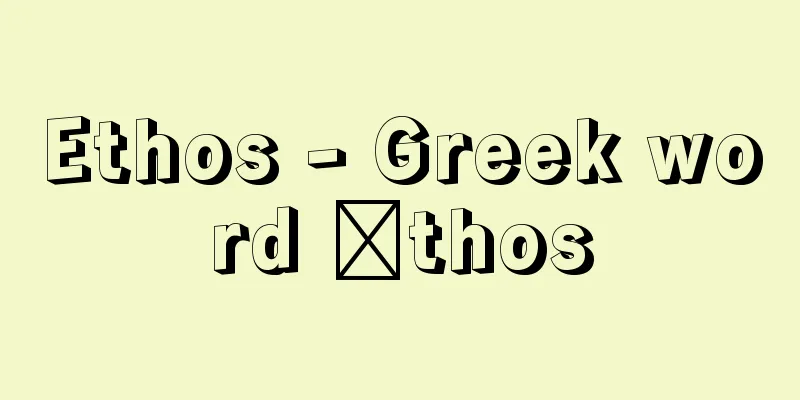Ethos - Greek word ēthos

|
Originally a Greek word meaning "character," it includes both innate nature and acquired habits. For individuals, it refers to the character of a person as distinguished from temporary emotions (pathos) and pure intelligence, and for society, it refers to the morals, customs, and habits that characterize a certain ethnic group or group. In this sense, the German word Ethik, which corresponds to ethics or morals, was born. However, ethos does not refer to what should be (sollen) consciously established as a value norm, but rather to the customs shared by a group or social class that unconsciously regulate people's character , and the character created by them, and words such as collective mentality, mental structure, and human type are used as translations of it. It was Max Weber who emphasized this meaning and incorporated it into academia as a methodological concept. He took up ethos not at the level of ethical theory, but at the level of motivation for social actions toward religion, politics, economics, etc., and carried out many sociological analyses, relating it to the purpose-means relationship and the social strata of the people who carry it out. Terms such as the "spirit" of capitalism and the economic "ethics" of world religions refer to ethos in this sense. Later, Fryer came up with the concept of ethos science, which provides ethical value judgments, in opposition to value-free logos science, but this usage is not followed today. [Tokunaga Makoto] Source: Shogakukan Encyclopedia Nipponica About Encyclopedia Nipponica Information | Legend |
|
本来ギリシア語で「性格」を意味することばであるが、生まれつきの天性と後に身につけた習性との両面を含む。個人については、一時的な感情(パトス)や純粋な知能と区別されたひととなり、人柄をさし、社会的には、ある民族や集団の特徴をなす道徳、慣習、習俗などをさす。この意味で、倫理ないし倫理学にあたるドイツ語Ethikが生まれてきた。ただしエートスは、価値規範として自覚的に定立された当為(ゾルレン)ではなく、集団や社会層に共有されて無自覚的レベルで人々のひととなりを規制しているしきたり、またそれによってつくられた人柄をさし、集合的心性、精神構造、人間類型などのことばがその訳語として用いられている。 こういう意味を強調して、方法的概念としての学問のなかに取り込んだのは、マックス・ウェーバーであった。彼はエートスを倫理学説のレベルではなく、宗教、政治、経済などへ向かう社会的行為の動機づけのレベルで取り上げ、目的―手段連関や担い手の社会層と関係づけて、多くの社会学的な分析を行った。資本主義の「精神」とか世界宗教の経済「倫理」とかいうことばは、この意味でのエートスをさしている。のちにフライヤーは、没価値的なロゴス科学に対立させて、倫理的価値判断を与えるエートス科学という概念を考えたが、今日ではこの使い方は踏襲されてはいない。 [徳永 恂] 出典 小学館 日本大百科全書(ニッポニカ)日本大百科全書(ニッポニカ)について 情報 | 凡例 |
Recommend
Toyohama [town] - Toyohama
This former town in Toyota County consists of sout...
Garrison - William Lloyd Garrison
American abolitionist. Born in Newburyport, Massa...
Cardiac muscle
It occupies most of the tissue that makes up the ...
Sports Heart
A cardiac condition seen in people who engage in s...
Tomoko
A mutual aid organization for miners. It was estab...
Siebold's Earthworm - Siebold's Earthworm
A large annelid of the family Pheretidae of the cl...
cream
〘noun〙 (cream)① A soft, white fat used to make swe...
Multiple pregnancy
This refers to the condition in which two or more ...
Utagawa Toyoharu
He was an ukiyo-e artist of the late Edo period, ...
《My Way》(English spelling) MyWay
...He founded Reprise Records in 1961, and was cl...
Gidayu Kyogen
〘noun〙 The name given to Kabuki scripts that incor...
Nippur - Nippur (English spelling)
Nufal is a city ruin located about 30 km northeas...
Node - Fushi
〘noun〙① The part of a plant trunk or stem that is ...
Linna - Rinna (English spelling) Väinö Valtteri Linna
Finnish novelist. Born in Uljala. After graduatin...
Rockingham
British politician. Prime Minister during the Amer...









